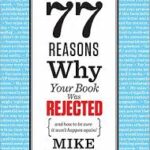Book Recommendations for All You Budding Freelance Writer Entrepreneur-Types
This past winter has been a hellishly bleak and frigid ice-scape, filled with dark mornings, dark nights, burst steam pipes, and broken furnaces. And frankly, it’s been hard to get myself motivated to do the work people are paying me for, let alone the personal projects that will someday bring me literary acclaim.
Still, despite the fact that I’m still wearing cardigans and cat slippers in my home office, I feel that spring is coming, and this gives me a renewed sense of purpose.
In fact, it’s this time of year that always inspires me to take on bigger and more ambitious projects as a means of revitalizing what the long, cold winter (and seasonal affective disorder?) attempted to kill. If you’re anything like me, I can only assume you’re suddenly itching to write a book, launch a new arm of your business, land a literary agent, or open a coworking space.
Before you get ahead of yourself, though, might I suggest the following resources?
If You’re Looking to Write a Book and Perhaps Get It Traditionally Published:
First, you have to write the darn thing, which is a massive undertaking all on its own. For all you fiction writers out there, I recommend Anne Lamott’s Bird by Bird, a book I adore immensely despite not being a fiction writer myself. For everyone with a memoir inside of them, I have to gush about Adair Lara’s Naked, Drunk, and Writing. It really gets into the nitty-gritty of essay and memoir construction, and also gets down to the business of revising, market research, book proposals, writing partners, and more.
And speaking of book proposals, I recommend Mike Nappa’s 77 Reasons Why Your Book Was Rejected. Its author, a literary agent and former acquisitions editor, provides readers with the many reasons an editorial board, marketing department, or sales team might pass on your book, and then gives tips on how to avoid each of these pitfalls. He also gives aspiring authors an inside look at the book proposal consideration process, which may make readers amazed that any book has ever made it to publication.
Or you could try Betsy Lerner’s classic The Forest for the Trees, which covers manuscript submission, literary agents, query letters, working with editors and publicists, dealing with rejection, and more.
If You’re Looking to Go Full-Time Freelance:

I launched my own freelance career about seven years ago with the help of Michelle Goodman’s Anti 9-to-5 Guide and her followup, My So-Called Freelance Life. Goodman was like my freelance spirit animal, and her books were pure gold for a beginning freelance writer like me.
Goodman’s first book explored the various alternatives to your typical full-time job; the “seven habits of highly effective homepreneurs”; how to write up a business plan; low-cost publicity tactics; getting a business license and registering your business; and so much more. Her next book went on from there, covering the cold-pitching of dream clients, the setting of rates, etc. While her first book looked at all the alternatives to your average nine-to-five (part-time gigs, temp work, telecommuting, etc.), the second one really honed in on what was required to build your own freelance business, with no one to answer to but yourself.
Speaking of rates, Laurie Lewis breaks it down for you in What to Charge, covering everything from figuring out your hourly rate to drawing up contracts. I swear that the most common question I get from my coaching clients is: how do I set my rates? Unfortunately, there’s no one-size-fits-all response to that, but Lewis does a good job of helping newbies find the answer for themselves.
If you’re a bit more of a seasoned freelancer, you can always find some new tricks in books like The ASJA Guide to Freelance Writing and Kelly James-Enger’s Writer for Hire.
If You’re Looking to Take it to the Next Level and Take Over the World:
I’ve already mentioned this one in an older post, but I cannot stop pushing Lauren Bacon and Emira Mears’s The Boss of You. The authors walk you through the basics of figuring out the startup costs of your brand spankin’ new business. They show you how to draw up a budget. They provide you with a list of all the paperwork you need to make your business legit. They highlight the importance of soliciting testimonials. They talk about invoicing, contract terms, and delinquent clients. Hell, if you have a question about starting up your own business, this book has the answer.
In my last post, I wrote about avoiding homelessness and starvation as a writer. But now that we’re really starting to feel motivated to make a change (I credit the sunshine), it’s time to get really serious. The Ploughshares blog is about the creation and consumption of fantastic literature. This post (not to mention my last one) is about immersing yourself in that kind of life in a way that’s sustainable.



